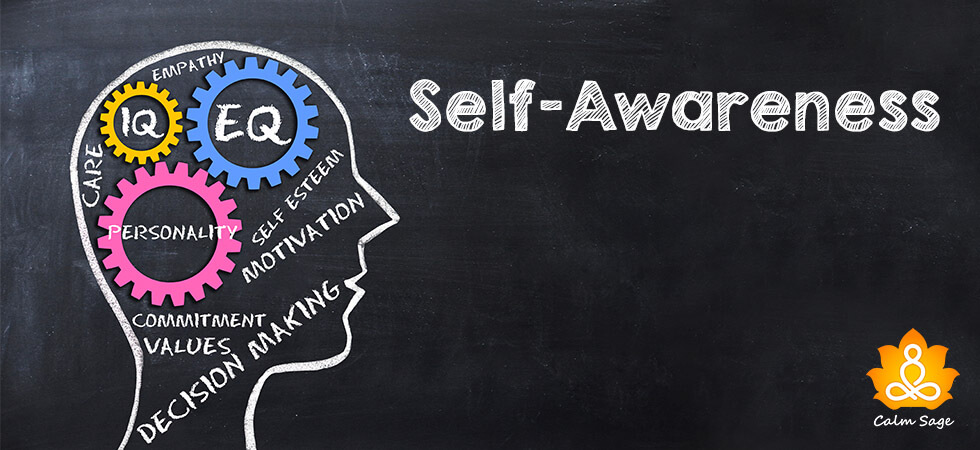What Is Self-Awareness and Why Is It Important?

Self-awareness is a concept of Self that urges you to become aware of your Self’s different aspects – from behaviors and thoughts to emotions and feelings. It is a concept of a psychological state wherein the Self becomes the center of attention.
No one is born with the complete awareness of self but in some studies, it was found that infants have a basic understanding of self-awareness. In one research, it was found that infants develop self-awareness around the age of 18 months.
Having the understanding of self-awareness means that you are acutely aware of your personality, strengths and weaknesses, thoughts and beliefs, and emotions. Many people feel like they have a strong sense of self-awareness but it’s not always the case.
We need a high sense of self-awareness to become successful in life. How? A self-aware person is highly aware of when a good opportunity knocks on their door and how it will help them move forward. When we are aware of our successes and failures and why we do what we do, we are more likely to succeed than others.
Types Of Self-Awareness:

Psychologists categorize self-awareness into two; Public and Private:
1. Public/External Self-Awareness
Public self-awareness or external self-awareness is the type when people are aware of their appearance (emotionally or otherwise) in public. Public self-awareness drives people to stick to social appearances. This type of self-awareness is about looking at ourselves from others’ perspectives and taking a step in improving ourselves.
Awareness of ourselves in a public setting can make us more focused on our work. When a person is publically self-aware they begin to appreciate their influence in others’ lives as well.
2. Private/Internal Self-Awareness
When a person is aware of some of the aspects of the Self but only internally, it can be termed as private or internal self-awareness. An example of this can be; seeing your face in the mirror, the fluttering you feel in your stomach when you realize you forgot something, the “butterflies in your stomach” when you see someone you love – are all examples of private or internal self-awareness.
Private self-awareness is about focusing your attention on your goals, aspirations, emotions, values, and beliefs. When a person is self-aware, they can recognize their thoughts and act on them in a way that helps them improve their Self.
Benefits Of Self-Awareness
Also Read: Conscious Escapism: The Much-Needed Break From Spiritual Journey
Becoming self-aware has many benefits. Some of them can be:
Self-Awareness can help you;
- Decrease stress
- Strengthen relationships
- Improve thinking and decision-making skills
- Increase productivity and motivation
- Increase happiness and life satisfaction
- Become a better person and a leader
Traits Of Highly Self-Aware Person:
Anyone, at any time, can become self-aware. Everyone can learn to become more aware and evolved. Here, I have compiled a list of some characteristics or traits of a highly self-aware person:
1. Humility
A self-aware person performs selfless acts towards others and is confident in their abilities but not overconfident. They know their value and try to put others before themselves.
2. Discipline
A person with high self-awareness is focused on the task they are doing and has total control over their mind and body. Self-awareness means you are aware of who you are and what makes you – you.
3. Gratitude
Again, a self-aware person knows that what they have is enough and is thankful for that. They accept what they have, acknowledge its importance, and express their gratitude for it.
Also Read: 2021’s Best Gratitude Journals to Transform Your Life
4. Honesty
Integrity, honesty, and virtue are what motivate a highly self-aware person to act in life. With experience and knowledge, a person learns what is right and wrong which, in turn, helps them sharpen their morals and beliefs.
5. Passion
A self-aware person knows what their passion is and they spend their energy following it. Passions change as one goes through life but one thing remains constant – the happiness, joy, and contentment the passion brings.
Are you self-aware? Ask yourself these questions;
Am I humble enough?
Am I disciplined enough?
What do honesty and virtue mean to me?
What am I most thankful for?
What is my passion?
How To Improve Self-Awareness?
To improve self-awareness, all you need to do is keep in mind these tips;
1. Stay Objective
Trying to stay objective when it comes to ourselves can be a bit difficult but once you come to look at yourself objectively, you get to know the real you. All you need to do is;
- Understand yourself and what makes you tick but do not compare yourself to others.
- Think about your achievements and accomplishments you’ve gained so far in your life.
- Think about what made you happy back when you were a kid. Has it changed? Or Is it the same? What are the reasons it changed?
- Listen passionately but actively to what others say about you to you. Accept their honest feedback and try to change your negative habits into positive ones.
2. Start A Journal
A journal is where you can write anything that comes to mind. Record your thoughts and feelings on a paper. Journaling is an amazing way to clear your mind and make space for new thoughts and ideas. Write about your day; what made you smile? What do you think you were lacking? Did you succeed in your tasks?
This exercise will help you get a better idea of yourself and what you need to focus on in life.
3. Write Down Your Goals & Priorities
I did this exercise with one of my friends. I asked her to write down her top priorities and goals and focus on them one by one. Starting with yourself. If your goals are large, then break them down into smaller goals but don’t let them overwhelm your priorities.
Related: S.M.A.R.T. Goals The Key To Achieve Your Aim, Manage Time, and More
4. Practice Self-Reflection
Self-reflection is time-consuming but so worth it. With our busy schedules practicing self-reflection can be difficult but all you need to do is set aside 5-10 minutes each day to focus on your Self.
Here’s some journal prompts to help you get started on your journey of self-reflection.
5. Practice Meditation Or Mindfulness
Meditation or mindfulness are exercises that help you improve your mental prowess. Many meditation practices focus on breathing but not all. Mindfulness is a practice that focuses on teaching you how to stay in the present moment.
To increase self-awareness, you can try the Visualization meditation technique
Related: Simple Mindfulness Exercise For You To Try (Beyond Meditation)
6. Ask Feedback From Friends & Family
To understand what your influence is on your loved ones, all you need to do is – ask. Listen to the feedback your friends and family give you. Tell them that you want their honest, unbiased opinion and provide them with a safe space when they give their perspective.
Ask questions and let them know why you need their feedback. Listen actively and try to understand their point even if they are being critical. It’s for your good, after all.
Self Awareness Activities for Adults
Gaining self-awareness allows you to make a positive change in your life and your behavior. It provides you an opportunity to gain self-confidence and self-worth as well.
Here are some self-awareness activities for adults that they can practice to increase self-awareness:
1. Start A Journal

Keeping a journal not only helps you record your past experiences, thoughts, and feelings but also helps you learn from them. By reading your past thoughts and experiences, you reflect on your current Self and see how far you have come. Keeping a journal will help you put a new perspective on yourself.
Also Read- Journaling For Stress Relief: 15 Best Anxiety Journals For You!
2. Write A Personal Statement

A personal statement helps you describe your core beliefs and values. Writing a personal statement will help you understand your personal beliefs, the whys, and what’s about it, and will allow you to call for action. This statement will point you in the right direction where your life should be going to achieve your goals.
To begin, you can answer questions such as;
What do you stand for?
What are your beliefs?
How do you want to live your life?
What words define you?
What words or statements do you live by?
Whenever you feel stuck in your life, you can always refer to your statement as a guide.
3. Create A Bucket List
Creating a bucket list isn’t just for fun. It also gives you a chance to recognize your personal and professional aspirations, goals, and what you need to do to reach them. In our busy lives, we hardly pay attention to our long-term goals and dreams. Creating a bucket list keeps us focused and pushes us to make an effort to reach them.
Plus, it will give you great satisfaction when you cross an item on your bucket list.
4. Practice Self-Talk

It is easy to judge ourselves when we come up short of our expectations. How we talk to ourselves matters – a LOT. How you respond to your failures and successes strongly affects how you view yourself and also how others view you. Self-awareness can be improved when you focus on the positive aspects of your failures more than the negative ones.
Also Read: Mental Health Benefits Of Positive Self Talk
5. Go For A Walk
Going for a walk can help you connect with your senses and explore your feelings and thoughts going through your mind. Treat a walk as a meditative exercise and let your thoughts flow. Walking will help you sort through your thoughts and feelings and will help you make an action plan to accomplish your goals.
Related: One Step at a Time: A Guide to Mindful Walking
6. Read, Read, Read
One thing is common when it comes to people being successful – Reading. Reading regularly not only helps you expand your vocabulary but can also help your problem-solving skills as well your cognitive abilities.
Read whatever interests you. Once you’re drawn to reading, you’ll find yourself going back to more reading and researching that will eventually lead you to become aware of the direction your life is heading.
Also Read: Bibliotherapy | Healing Power Of Words
7. Write A Regret Letter
Writing a letter to your younger self is a cathartic experience – an exercise that will leave you feeling light. Write in the letter your regrets and apologize to your younger self for any mistakes you may have made in the past.
What you write in your regret letter will help you feel empowered and will also help others such as yourself know that regrets are a part of life and they are not alone in their struggles.
9. Write Your Eulogy
Take some time to write an imaginary eulogy of yourself. This might feel like a silly exercise but doing this will help you understand how you want to live your life and how you would like to be remembered when you’re gone.
To begin, you can answer questions such as;
How do I want to be remembered?
What will be my legacy look like?
What should people remember me as?
Writing your eulogy will provide you with a purpose and a perspective on your daily activities. It will also allow you to give yourself time to self-reflect and know who you are.
Related: What is Ikigai: A Japanese Concept To Find Your Purpose In Life
Self-Awareness Activities for Kids
Teaching kids to develop self-awareness and emotional intelligence is tough but not impossible. You just need the right tools. Some activities that can help your child with self-awareness can be;
1. Emotional Pie Exercise
The emotional pie exercise is a fun and healthy way for kids to discuss and express their emotions. With the help of Plutchick’s Wheel Of Emotions (see diagram below), you can teach your child to name each emotion with representative colours in the wheel.
Once your child has identified their emotions – from most important to least important – you can encourage them to use colours (as on the wheel) to represent their feelings.

For example; They can use the color red to indicate they’re feeling angry. This activity will help them understand their emotions and can learn to describe the feelings that come with the emotion.
2. Sentence Starter Exercise
If your kid is older, you can offer them sentence starters to encourage them to express themselves. Some sentence starter you can use can be as;
- In my free time, I like to….
- I’m happy when I’m….
- When I make a mistake, I feel….
- When things don’t go my way, I feel….
- When I feel bored, I like to….
This exercise will help your kid understand themselves better, thus increasing their self-awareness.
3. Mindfulness For Kids
Mindfulness is an amazing tool and exercise to help adults with self-awareness and it is as helpful for kids as well. With a kid, you can try the following mindfulness exercises;
- Box Breathing; Breathe in with a count of 4, hold the breath for 4 seconds, and release while counting to 4.
- Simon Says; This classic game is not only a wonderful way to increase self-awareness but can also improve listening skills.
- The Present Moment; This exercise focuses on the child writing or speaking what they hear, see, touch, smell, and feel in the present moment.
4. Emoji Plate Exercise
This is also a fun activity to engage in with kids. The emoji plate exercise can help your child develop an ability to express their emotions by making paper plates into emojis with labels. For emotions such as anger, irritation, and frustration – young children can find it difficult to process or express. With this activity, they can learn to express their emotions in a fun and positive way.
How To Apply Self-Awareness To Different Careers
Learning how to become self-aware is not only helpful in your personal development but your professional life as well. Being self-aware can be helpful in many career paths but in these careers developing self-awareness can be highly beneficial:
1. Social Work
If you’re a social worker, having a higher sense of self-awareness can come in handy. In the field of social work, you encounter people in tough situations. Social workers are required to be aware of their bias when it comes to dealing with challenging clients. Being self-aware can help you deal with and treat each client equally and unbiased.
2. Leadership Roles
To have a strong leadership ability, you need to be able to answer questions such as ‘what is the meaning of self-awareness?” Being a leader requires you to be able to lead with purpose, discipline, and honesty. Being self-aware is effective when it comes to making smart decisions.
3. Nursing
The nurse-patient relationship is one of the most important and revered relationships in the medical field. Nurse who can understand their own emotions and feelings can provide better care to their patients.
4. Counseling
Self-awareness is highly required when it comes to roles like counseling. When you can understand who you are, you can help others on their journey as easily. Counseling is a career that requires a journey of self-discovery. When you’re able to observe and recognize your thoughts and feelings, you’re more likely to help others understand theirs.
5. Education/Teaching Roles
Self-awareness plays a major role in the field of education because, as I said before, you need to be able to understand your emotions, feelings, and thoughts before you can attempt to understand others’. An educator’s role is to help their student learn self-reflection, self-evaluation, self-reliance, and productivity.
In Conclusion
Self-awareness is a concept that requires you to be acutely aware of your emotions, feelings, behaviors, actions, values, morals, etc. It is a tool that requires you to be honest to yourself about your strengths and weaknesses, successes and failures – and whatever makes you, YOU.
I hope this article helped you understand the concept of self-awareness, traits of highly self-aware people, how to increase self-awareness, and more.
For additional information, you can always reach us on our social media pages or write to us at [email protected].
“The most important conversations you’ll ever have are the ones you’ll have with yourself.” – David Goggins




















